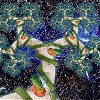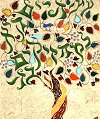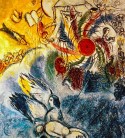|
In the account of the creation of the universe (בְּרִיאַת הָעוֹלָם), the Torah describes each day of God's handiwork as "good" (טוֹב) except for the Second Day, when God made the expanse and separated the waters (Gen. 1:7). Moreover, although the phrase "God saw that it was good" is indeed mentioned on the Sixth and final Day of creation (Gen. 1:25), it is stated immediately before the creation of man, which has led some of the sages to attempt to connect the two omissions. Why does the Torah seem to withhold the verdict that man is good? Is there are connection between the separation of heaven from earth and the creation of man?
Maimonides stated that God created Adam with free will (בְּחִירָה חָפְשִׁית), and therefore the Creator (הַבּוֹרֵא בָּרוּךְ הוּא) could not decree that a particular man shall be good or evil. In other words, man is not preprogrammed to be good, but instead must choose the good in order to be good. Nehama Leibowitz says that this implies that God wants man to be a "partner" in his own creation (Studies in Bereshit). The "separation" of heaven from earth (on the Second Day of creation) is therefore intended to be overcome by man uniting the "dust of the earth" (עָפָר מִן־הָאֲדָמָה) with the "breath of life" (נִשְׁמַת חַיִּים) that makes up his humanity. This is hinted at in the language used to describe man. Instead of the previous formula, "Let there be...[something after it's kind]..." the Torah says "Let us make man in our image (צֶלֶם), according to our likeness (דְמוּת)..." (Gen. 1:26). People were created to reveal the image and likeness of God Himself. Just as God fills the heavens and the earth, so humans were initially created to mediate and resolve the separation between heaven and earth by means of their relationship with God. This is the idea of exercising "dominion" (מִרְדָּה) in a manner similar to the rule of God over all of creation (Gen. 1:26).
But what about the statement, "And God saw everything that he had made, and behold, it was very good" (Gen. 1:31)? On the one hand, this means just what it says: all of creation was perfectly made, just as God intended. On the other hand, Jewish tradition states that the term "very good" was "code" for the yetzer hara (יֵצֶר הָרָה), or the evil inclination (Bereshit Rabbah 9:7). The early sages called the yetzer hara "very good" because without natural urges, people would not strive to do good, to marry, and so on. In other words, the natural urges were given so that they would be sanctified and therefore made "very good." This is the idea that we "descend in order to ascend" back to God. There could be no teshuvah (repentance) without the need to subdue our lower nature in submission to God.

The question is raised as to why Adam was created alone. Why didn't God create Adam and Eve together at the same time, or perhaps even create a community of people? The sages answer that God created Adam alone as "olam malei" (עוֹלָם מָלֵא), an entire world, to teach us that each individual person is of great value and significance. "Thus anyone who sustains one individual has sustained the world; and anyone who destroys one individual has destroyed an entire world." In addition, God created man as a solitary creation to remind all people that they descend from a common source. No one has a greater or better lineage than anyone else. Moreover, each of us is created with a radical sense of "aloneness," since - despite our relationships with other people - each of us is born alone and will die alone. This sense of aloneness is a built in "hunger" for relationship and especially for God's presence. Therefore the very first commandment comes in the form of a blessing: "And God blessed them and said, פְּרוּ וּרְבוּ / pru urvu: "be fruitful and multiply" (Gen. 1:28). People were created to be in fellowship with others and with God, and when this is lacking, there is a profound soul hunger and divine need.
Indeed, the first "lo tov" (לא־טוֹב / "it is not good") statement made in the Scriptures concerned Adam's state of solitude in the garden (Gen. 2:18). Adam needed a companion, an ezer kenegdo (עֵזֶר כְּנֶגְדּוֹ), a "helper opposite to him." The creation of Eve is sometimes translated as a "helper fit for him [Adam]," though the Hebrew here literally means "a helper against him." This unusual phrase is interpreted disjunctively by Rashi to mean that the relationship between Adam and Eve would imply a choice: Either Eve would be a help or an antagonist based on their merit. If the relationship is based on trust, then Eve would be ezer (help), but if it not, she would oppose him. The sages note that the Hebrew word for man (אִישׁ) and the word for woman (אִשָּׁה) share the same root word (אֵשׁ), meaning "fire." The words differ by just two letters - a Yod and a Hey (יה) - which together form one of the Divine Names. If God is present between them, then they will be rightly related as man and woman, but if God is not present (symbolized by the absence of the Yod and Hey, respectively), there will only be a destructive fire (אֵשׁ).
God originally "placed" Adam in a beautiful orchard (or garden) of fruit trees located in the "east," in a region called "Eden." In the midst of the lush trees of the orchard God had placed two special trees, called the "Tree of Life" (i.e., etz chaim: עֵץ הַחַיִּים) and the "Tree of the Knowledge of good and of evil" (i.e., etz ha-da'at tov va'ra: עֵץ הַדַּעַת טוֹב וָרָע). A river ran through the orchard that divided into four headwaters (Gen. 2:9-10). It is worth noting here that both of these special trees were located "in the midst" of the garden (בְּתוֹךְ הַגָּן), which implies that in order to eat from the Tree of Life, Adam and Eve would have to face the Tree of the Knowledge of good and of evil. Since the Torah remarks that both trees grew "in the midst" of the orchard, some of the sages have said that both trees shared the same root (or even that they grew from the same trunk).

The Midrash says, "Two trees were both in paradise. This is to teach you that man can find everything there. He who seeks the Tree of Life finds it there. He who seeks the Tree of Good and Evil also finds it there. Man has two roads before him and can take the one he wants. If he wishes to follow the road of goodness, the door is open and he can find happiness. If he wants to follow the road of evil, the way is clear for him and he will come upon woes."
In Genesis 2:7 we read: "Then the LORD God formed (יֵצֶר) the man of dust from the ground and breathed (נָפַח) into his nostrils the breath of life (נִשְׁמַת חַיִּים), and the man became a living soul (נֶפֶשׁ חַיָּה)." The word yetzer ("formed") refers to something shaped, like pottery fashioned by the hand of a potter. Just as a potter purposes a shape before forming an object, so God intended the image of man. The sages use the analogy of a glassblower who creates a glass vessel. Just as a glassblower blows into a tube to form a vessel from molten glass, so the breath (i.e., neshamah: נְשָׁמָה) that comes from the LORD functions as spirit (רוּחַ) that forms the human soul (i.e., nefesh: נֶפֶשׁ). The Targum states that God breathed into Adam the ability to think and to speak. In other words, thought and speech are two primary characteristics of the image (tzelem) and likeness (demut) of God (for more on this, see this).
God then put Adam in the orchard "to work it and keep it" (Gen. 2:15). The Hebrew, however, suggests that God put Adam there to rest (נוּחַ) and to serve (עֲבוֹדָה) Him there. A better reading, then, would be that God created Adam to worship and obey Him in the orchard. In other words, God created Adam to be a priest, not a "gardener." He was created b'tzelem Elohim (בְּצֶלֶם אֱלהִים), in the image of God, in order to mediate the finite world with the eternal world (Gen. 1:28). The orchard was a place of great beauty and comfort (i.e., pardes: פַּרְדֵּס). Indeed, the LXX translates the Hebrew "garden of Eden" (גַן־עֵדֶן) using the word "paradise" (παράδεισος).
The first commandment given to Adam was that he could eat from all of the trees of the orchard except for the Tree of the Knowledge of good and of evil, "for in the day that you eat of it you shall surely die" (Gen. 2:16-17). The consequence for disobedience to God's revealed commandment was the death penalty (מוֹת תָּמוּת), the same term used elsewhere in the Torah as a pronouncement of judge on one who is condemned to die (Exod. 31:14; Lev. 24:16, etc.). In other words, like the covenantal terms given to Israel at Sinai, "keeping the land" would require obedience to God's revealed will.
Why was eating from the Tree of the Knowledge of good and of evil forbidden to Adam and Eve? Why was this test of obedience given? Surely God foresaw the disastrous outcome of the test and understood all the implications. He knew Adam and Eve would fail the test. Indeed, God allowed the "monster in the garden" (Satan) to maliciously tempt Eve... The midrash further elaborates that the fruit of this tree was more beautiful and appealing than any other in the orchard. Moreover, in order to eat from the Tree of Life, Adam and Eve would have to come near to the forbidden tree - to confront it - and then make their decision. So why did God test Adam and Eve in this way?
In general, the Jewish sages teach that the test centered on the gift of giving free will to Adam and Eve, though they differ regarding what this means. The Abravanel, for example, says that the knowledge represented by the forbidden fruit should not be regarded as basic moral awareness, since Adam and Eve were created in the image of God, and this implies that God created them as free moral agents from the beginning. So long as Adam obeyed God, his soul was "suffused with an eternal inner glow" that hovered over him and made him immune from temptation. The Abravanel therefore says that the fruit of the tree represented the lust for carnal pleasure and material gain. When Adam and Eve sinned by eating the fruit, they left God's will by seeking their own good, apart from God. They elevated the carnal, the this-worldly, and the temporal over the spiritual, the eternal and heavenly and thereby set in motion the ongoing "wheel of desire..." Maimonides disagrees, and states that free will was "created" only after Adam and Eve had disobeyed God. Eating the fruit, therefore, was an exercise of autonomy, a "throwing off" the constraints of God's rightful rule as King. Man no longer automatically follows the will of God since desire and "free will" were now within the heart of man.
Both of these approaches are problematic, however. First, regarding Abravanel's view, how was it possible for Adam and Eve to sin - to "lust for carnal pleasure" - if God had created them "very good," and placed them in a form of paradise? Second, regarding Maimonides' view, how was it possible to sin against God if man was created, by his very nature, to simply do what is right, "as do the heavens and the heavenly host" (Maimonides: Bereshit). How could Adam and Eve be held responsible if they did not possess any form of free will from the beginning? Of course, the question of can be pushed back to how it was possible that the "serpent" (i.e., the nachash, נָחָשׁ, a symbol of Satan), initially chose to rebel and was later given access to the orchard - before the creation of man. Why did God allow the "monster in the garden" to tempt Eve? The presence of the monster (i.e., Satan) and the further requirement to withstand his malice surely constituted a different sort of "test" than being commanded to abstain from eating of the fruit of the Tree of Knowledge. Was the devil used as the mouthpiece of testing, since Adam and Eve were too innocent (or unaware) to raise the question of disobedience in the first place? Was the devil a "tool" God used to "force" Adam and Eve to make the choice? Though there are some allusions in Scriptures that seem to refer to the earlier "fall of Satan" (Ezek. 28:12-19, Isa. 14:12-20, John 8:44, 1 John 3:8, etc.), it must be confessed that we do not know why the possibility (and actuality) of evil was permitted in a world made by a perfect God (Isa. 45:7). The Scriptures are clear, however, that God is morally perfect and entirely righteous. He never lies and He never tempts anyone to commit sin (James 1:13).
Others have attempted to explain these mysteries by saying that although man had a "degree" of free will from the beginning, it was an "abstract" free will, based on the theoretical ideas of truth and falsehood. Before the sin, evil therefore remained "external" to Adam; after he sinned, however, Adam "personally entered" the realm of sin and evil. The evil "moved inward" and became something subjectively known as the impairment of the will to obey God's commandments.
This leads to the core question about the role of the test in the orchard. Is good and evil determined objectively or subjectively? In other words, who has the right to define what is good and what is evil? The test of the Tree of Knowledge surrounds the question of moral authority. If Adam and Eve consented with the devil's questioning of God's moral will, then good and evil would be defined and known in subjective terms, based on their personal experience. Moral truth therefore would become subjective and relative and eventually would be qualified out of existence. The lesson of the Tree of Knowledge is that man is accountable to God for moral truth, and it is God's prerogative - not man's or the devil's - to define what is good and evil.

The Tree of Life stood directly beside the Tree of Knowledge in the middle of the orchard (Gen. 2:9). The fruit of the Tree of Life imparted eternal life (חַיֵּי עוֹלָם) and was presumably intended to nourish higher life in the realm of God (Gen. 3:22), whereas the Tree of Knowledge represented evil and the judgment of death (Gen. 2:17). In order to attain eternal life, therefore, Adam and Eve had to face both trees in their service before God. The test of the orchard was therefore the test of teshuvah - that is, whether Adam and Eve would turn to God or turn to evil. Satan's deceptive appeal to Eve was that the fruit of the Tree of Knowledge would give her wisdom that would make her "like God," knowing both good and evil. Eve only knew the possibility of evil, not its actuality, and Satan implied that this represented a lack of wisdom. Eve then "saw" that the fruit of the tree was good, thereby negating God's vision and sustenance for her life. The essence of temptation focused on her pride and her desire to acquire wisdom using her own autonomous reasoning. The fruit represented self-will and the abandonment of God's rule as King of the universe. Eve's sin was ultimately that of unbelief (which is the reason why we must be saved by faith, as a reversal of the original sin). When she ate the forbidden fruit, the body (carnality) became the central focus and shame was the result.
It is interesting to compare the commandment that God originally gave to Adam with Eve's recounting of it to the serpent (נָחָש). Did Adam add to the commandment or perhaps miscommunicate its intent to Eve? What explains this "distance" between God's intent and Adam and Eve's understanding? The Torah does not say. However, it is clear that Eve did not have a clear understanding of the commandment and this affected her ability to withstand the seduction of the serpent. First, Eve added to the commandment by saying that she was forbidden to "touch" the Tree of Knowledge (Gen. 3:3). She also seemed to overlook God's permission to eat from all the trees in the garden by focusing on the one tree she was prohibited from eating. Second, she subtracted from the consequence by rephrasing God's clear statement of the death penalty as a conditional: "lest we die." She regarded death as a possiblly bad outcome - not the clear consequence given by God. And third, she renamed the Tree of the Knowledge of good and of evil to "the tree that is in the midst of the orchard." Eve (and of course Adam, who presumably passed on God's original commandment to her) seems to ignore the fact that God has His own reasons for issuing the prohibition that involved testing their obedience to His revealed will... The meaning of the Tree was changed into something other than what is really was. Eve saw it as a source of danger, something inscrutably withheld from her, a privation, and so on, rather than as a means of exercising her will in obedience and service to God.
According to midrash, Satan found his opening in Eve's misunderstanding of God's commandment. While he was speaking with her, he actually pushed her against the forbidden tree and said, "See, you did not die by touching it, and neither will you die from eating it." Because her supposition proved false, Eve then began to doubt everything else that Adam had told her - and this led to her eventual decision to eat the forbidden fruit (Bereshit Rabbah 19:3). When Eve then "saw that the tree was good for food, and delightful to behold, and lovely as a source of wisdom," she took of the fruit (Gen. 3:6). Notice that the battle is always for the truth, and what you believe (your judgments) invariably determine what you will choose. It begins with how we choose to see. Eve "saw that it was good," thereby contradicting God's expressly revealed will.
The Tree of Knowledge functioned as a test of Adam and Eve's obedience to God's moral authority as the King of the Universe. After they failed the test, they were forced to face the consequences of their decision. They were prevented from partaking of the Tree of Life and sent into exile (Gen. 3:22-24). Paradise was lost, and their exile from the orchard foreshadowed the exile we all face through our own disobedience before God.
It is said that "God creates the cure before the plague." Yeshua is described as the Lamb slain "from the foundation of the world." His death on the cross functions as the Tree of Life for those who take hold of Him.

In Genesis 2:4 God is called Adonai Elohim (יהוה אֱלהִים), the first place in the Torah that these two Names of God are used together. Jewish tradition associates the name Elohim (אֱלהִים) with the attributes of divine power and Justice (i.e., God as Creator), whereas the name YHVH (יהוה) is associated with the attributes of divine compassion and mercy (Exod. 34:6-7). Because of the transgression of Adam and Eve, God is revealed as both the God of Compassion as well as the God of Justice (interestingly, when these two names appear together, YHVH comes first). The promise of the coming "Serpent Slayer," the One who would crush the kingdom of Satan, was given to Adam and Eve before their judgment was announced (Gen. 3:15). And even after their judgment was given, "the LORD God (יהוה אֱלהִים) made tunics of skin for Adam and his wife and clothed them" (Gen. 3:21) - a clear picture of being compassionately "robed in righteousness" imparted by an innocent sacrifice.
The promise of the coming "Serpent Slayer," the One who would crush the kingdom of Satan, was given to Adam and Eve before their judgment was announced.... And even after their judgment was given, "the LORD God made tunics of skin for Adam and his wife and clothed them" - a clear picture of being compassionately "robed in righteousness" imparted by an innocent sacrifice.
This is the prototype of the korban principle of "life for life" that was the basis of the sacrificial system and ultimately the death of the coming Redeemer. Judgment was not the end of the story, since God would send His Son to "reverse the curse" bequeathed by the first Adam (Gal. 3:13). The transgression of the first "federal head" of the human race was overcome by the obedience of the promised Seed - the Son of Man and "Second Adam" who would redeem humanity from the death penalty of sin (Rom. 5:12-21). "God created the cure before the plague," meaning that His love is the foundation of all things: עוֹלָם חֶסֶד יִבָּנֶה / Olam chesed yibaneh: "steadfast love built the world" (Psalm 89:2). Just as God created mankind only after He created the pathway of repentance (i.e., the "Lamb slain from the foundation of the world": 1 Pet. 1:20, Eph. 1:4, Rev. 13:8, 17:8), so the purification from death was likewise foreseen and provided. "For as in Adam all die, so also in Messiah shall all be made alive" (1 Cor. 15:22). Because of the salvation given to us in Yeshua, "Just as we have borne the image of the man of dust, we shall also bear the image of the man of heaven" (1 Cor. 15:49). Those who overcome because of the victory of Yeshua are promised to eat of the Tree of Life in the Paradise of God (Rev. 2:7; 22:14).
"The God of Peace (אֱלהֵי הַשָּׁלוֹם) will soon crush Satan under your feet. The grace of our Lord Yeshua the Messiah be with you" (Rom. 16:20).
Hebrew Lesson
Lev. 17:11c reading & comments (click):
 |
|







